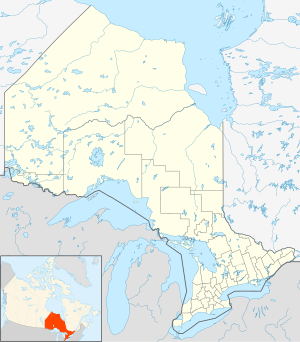CFS Carp Richardson Detachment
| CFS Carp Richardson Detachment | |
|---|---|
| Coordinates | 44°56′12″N 76°08′42″W / 44.93673°N 76.1449247°W |
| Type | Military Radio Transmitter Site |
| Site information | |
| Controlled by | |
| Site history | |
| Built | 1962[1] |
| Built by | |
| In use | 1962-1994[2] |
The CFS Carp Richardson Detachment was a military operated radio communications transmitter station linked by landline to CFS Carp located off Lanark County Road 10 East of Perth, Ontario. The detachment was built with a hardened two story underground bunker built to accommodate the Signals personnel needed to operate the transmitter in case of war, as well as a mess hall, sleeping quarters, offices, decontamination facilities, and its own power generation facilities. Its location was chosen to be far enough away from CFS Carp to ensure survivability in the case of a nuclear strike against CFS Carp, and to reduce the risk of interference from its twenty powerful radio transmitters.[1]
Separate radio receiver detachments were located and administered by CFS Carp in the region; the CFS Carp Almonte Detachment and the CFS Carp Dunrobin Detachment were linked to CFS Carp by land line also.[3][4]
References
[edit]- ^ a b Ozorak, Paul (2012). Underground Structures of the Cold War: The World Below. Pen & Sword Books Limited. pp. 12–13. ISBN 978-1-84884-480-3.
- ^ Ozorak, Paul (2012). Underground Structures of the Cold War: The World Below. Pen & Sword Books Limited. p. 44. ISBN 978-1-84884-480-3.
- ^ Forsyth, Bruce. "A Short History of Abandoned and Downsized Canadian Military Bases". Archived from the original on 23 October 2013. Retrieved 2 June 2013.
A two-story communications bunker was also constructed near Perth (Richardson Detachment), which was staffed exclusively by members of the Royal Canadian Corps of Signals (RCCS), later 701 Communications Squadron post-Unification.
- ^ "CFS Carp - Units". Archived from the original on 23 October 2013. Retrieved 2 June 2013.
CFS Carp was to provide the administration, security and housekeeping services needed to maintain a constant state of operational readiness for all sites under its command; most importantly, the communication facilities at Carp, Richardson, Almonte and Dunrobin

